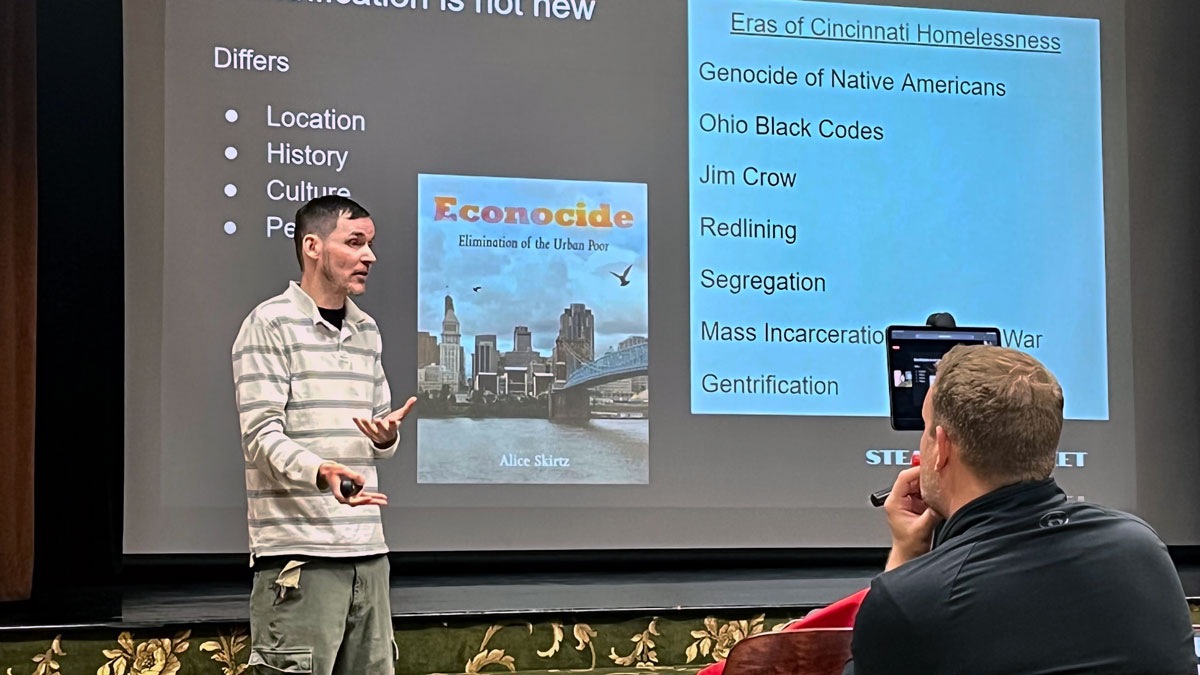Steal the Street author Dr. Mark Mussman educates the public about homelessness and gentrification in Cincinnati
Mussman (Western Program ‘01) discusses Cincinnati’s current state of homelessness and the housing crisis from his view as Director of Education at the Great Cincinnati Homeless Coalition.

Steal the Street author Dr. Mark Mussman educates the public about homelessness and gentrification in Cincinnati
On October 18, students, faculty, and guests came together for a discussion with Dr. Mark Mussman, Director of Education at Greater Cincinnati Homeless Coalition, where he explained that his goal for the night was to have his lecture be seen as the “beginning of a conversation” about homelessness and gentrification.
Mussman began his lecture, sponsored by the Western Center for Social Impact and Innovation, by sharing stories from speakers for the Greater Cincinnati Homeless Coalition with videos and quotes explaining what they do. He explained how Street Vibes, the Greater Cincinnati Homeless Coalition’s community newsletter, helps readers focus on homelessness and social justice issues.
“If you keep things bottled up inside, you often don’t know that you’re being treated unfairly,” Mussman said about sharing stories in Street Vibes. “But when you talk to somebody and you can compare your experience, then you start to understand how you’re being treated.”
Street-level perspectives on homelessness
 The lecture then transitioned to education about homelessness and gentrification. Mussman described the different ways in which a member of a community can experience homelessness. His examples included couchsurfing, car habitation, shelter life, and being homeless at home (living in a home with an anticipated eviction date and no future housing established or staying in a home that is unfit for human habitation). He defines gentrification as the loss of a safety net within one’s living community and proceeded to explain the different ways neighborhoods can be gentrified.
The lecture then transitioned to education about homelessness and gentrification. Mussman described the different ways in which a member of a community can experience homelessness. His examples included couchsurfing, car habitation, shelter life, and being homeless at home (living in a home with an anticipated eviction date and no future housing established or staying in a home that is unfit for human habitation). He defines gentrification as the loss of a safety net within one’s living community and proceeded to explain the different ways neighborhoods can be gentrified.
“Everything that made up your neighborhood and why you’re there is gone, so why are you still here?” Mussman asked rhetorically as he explained the effects of gentrification. “Your laundromat’s gone, your corner store is gone, your hair store is gone, your school is gone, your friends are gone ... and your rent has gone up, so why are you still here?”
He then focused on the history of gentrification in Cincinnati and eras of homelessness through the years. Homelessness in the city, Mussman explained, can be traced back to the genocide of Native Americans in southwest Ohio in the 19th century, followed by Ohio Black Codes and Jim Crow laws. Those eras were proceeded by redlining, segregation, mass incarceration, and gentrification, with major waves of displacement in neighborhoods like West End and Over-The-Rhine that exist today.
Mussman also discussed the displacement of Black families in Cincinnati’s West End for the development of FC Cincinnati’s TQL Stadium and its effect on the community.
“You can be successful and still fail in society when you are Black,” he said. “Black folks in this country often experience weathering. When you are up against the wall, at the end of your rope, always at crisis, that affects your ability to live a long and healthy life.”
Econocide and activating your expertise
Econocide, as explained by Mussman is the elimination of one’s home and finances often by force but mostly by greed from large corporations. Some companies and business owners have been called out for eliminating homes and finances from neighborhoods in Cincinnati. “When you change things and remove people from their homes, that’s a type of genocide,” Mussman said.
While it is possible to avoid gentrification to some extent, it is not inevitable. Abatement, and tax increment financing, and “community benefits agreements” that did not meaningfully involve the group targeted for displacement are all ways for affluent individuals to profit from gentrification.
Mussman concluded the lecture by sharing ways that members of local communities can become more knowledgeable about homelessness and gentrification happening around them. New and more affluent community members can:
- examine their privilege
- disrupt the institutions that criminalize Black people
- listen to marginalized voices
- discover who is excluded in the community conversations
- get involved in the movement by educating themselves and those around them.
“I want you to get between people who are being harmed by institutions and those institutions that harm them,” he said. “Whether that be police or a system of education that’s failing folks, listen to those voices.”
Mussman received his Bachelor of Philosophy from the Western College Program at Miami University. He then earned a M.Ed. in Educational Foundations and Urban Educational Leadership, and a Certificate of Peace Studies followed by receiving his Ph.D. in Educational Studies from the University of Cincinnati.
To view Mussman’s entire lecture, visit the Miami University Alumni Association’s YouTube page.